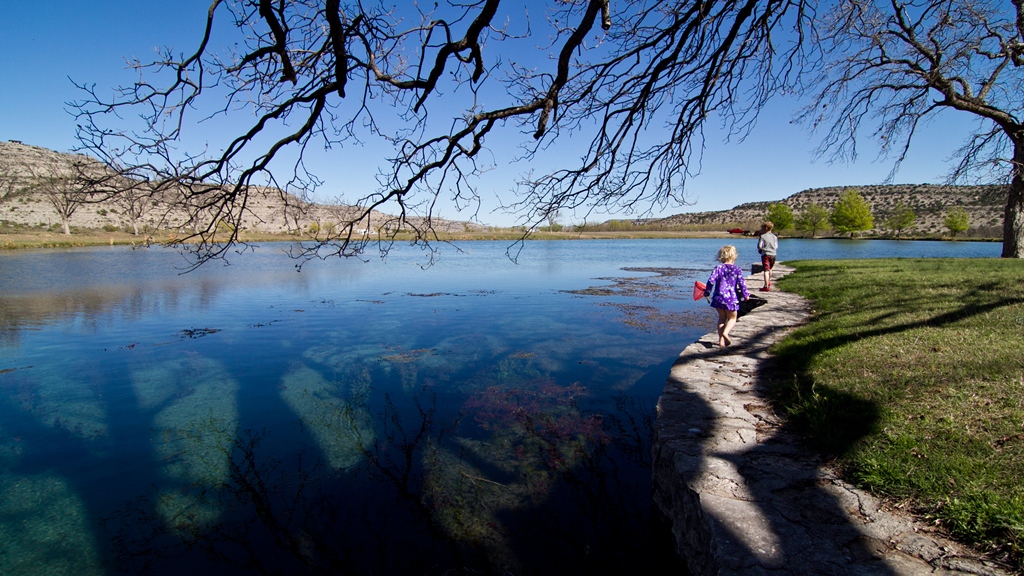The University of Virginia and Philippe Cousteau’s Azure Worldwide today announced a collaboration with The Nature Conservancy to develop a large-scale computer simulation game based on an as-yet-undetermined major Texas watershed. The Texas Water Game will highlight water issues unique to Texas, including water conservation and water sharing, with participants taking on the roles of regional stakeholders.
The game is the latest project in the U.Va. and Azure Worldwide’s Global Water Games initiative, which has produced a Chesapeake Bay watershed simulation and numerous national and international collaborations.
The Global Water Games initiative was announced by Philippe Cousteau, Azure Worldwide co-founder; U.Va. environmental sciences alumnus Andrew Snowhite; Laura Huffman, director of the Nature Conservancy Texas Program; and U.Va. Associate Vice President for Research Jeffrey Plank during a press conference at the South by Southwest Eco in Austin, Texas.
“Collaboration at the local level is essential for watershed conservation,” said Plank, who leads the Global Water Games project and U.Va.’s sustainability initiative. “The Texas Water Game will utilize science and economics-based game technology to demonstrate how community stakeholders can work together to pursue innovative solutions. This is an excellent opportunity for the University to work with The Nature Conservancy and Azure Worldwide on this fresh approach to finding solutions that work from both an economic and environmental standpoint.”
The Texas Water Game will engage stakeholders from multiple sectors – government, business, civic and community-based organizations, agriculture, nonprofit conservation, and universities – in identifying and sharing strategies for watershed conservation and water sharing. The Texas Water Game project will help set new directions for multiple-sector collaborations in local watersheds.
“Clean, unpolluted water is our most precious and most endangered natural resource,” said Cousteau, co-founder of Azure Worldwide. “Collaboration and innovative problem-solving are the only ways we can ensure that we will have enough clean water to support the needs of a growing global community. The Texas Water Game represents this new approach in tackling global challenges.”
Sustainable water management is rapidly becoming one of the greatest challenges of the 21st century, with serious implications for economic growth, food security and environmental health. In Texas, studies indicate that by 2040 the population will more than double, to 43.5 million people, while water resources will decrease by nearly 20 percent due to aquifer depletion and reservoir sedimentation. With that in mind, the Global Water Games template has been designed to address water quantity as well as water quality issues.
The project is an outgrowth of the U.Va. Bay Game, a large-scale interactive game simulation of the Chesapeake Bay watershed first developed in 2008. The Global Water Games platform allows players to take on the roles of various stakeholders in a given watershed, such as farmers, ranchers, developers, industry leaders and policymakers, and explore how their decisions affect the health and economy of the watershed. Simulation games can demonstrate to players how stakeholders with sometimes competing interests can collaboratively solve complex problems involving sustainability.
“Global Water Games is a template for the world, and we are working at partnering with many organizations, such as The Nature Conservancy, to modify and use this simulation game to assist stakeholders in watersheds under stress to explore innovative ways to think about the management of water,” Plank said.
Gerard Learmonth, a U.Va. systems and information engineering professor, worked with a staff programmer and three graduate students to develop the Global Water Games platform this summer – based in part on the original U.Va. Bay Game, but with many modifications and improvements that can apply to any watershed anywhere in the world for which adequate resource data is available. It is designed to help raise awareness of the effects of natural and man-made changes to watersheds on which humans and webs of wildlife are dependent. The template can be layered with data created by scientists and policymakers to customize the game, resulting in insight to human behavior and watershed management.
“We’ve improved the user interface, and included new features to the game to make it more user-friendly,” Learmonth said, “such as making background information on particular aspects of a given watershed readily available to players, to help them more easily make informed decisions. All they have to do is click on a word or phrase, such as ‘sustainable farming,’ and a screen pops up with relevant information specific to the watershed.”
“The Texas Water Game represents an important step forward in the evolution of the Global Water Games template,” Snowhite said. “The Texas Water Game expands on previous versions of the game template and addresses important challenges, including water quantity and water sharing. Each new version of the template creates new possibilities for collaboration and positive action.”
“With this new template we can engage globally with potentially any watershed,” Plank noted. “The western U.S. is an important region for water management issues because of the complexities of water rights issues in areas subject to drought conditions. With our customizable template, stakeholders in Texas watersheds will explore innovative ways to manage and share limited water resources in relation to local economic, environmental and legal institutions and conditions.”
The Global Water Games Initiative is a collaboration between U.Va. and Azure Worldwide, a strategic environmental design, development and marketing company co-founded by Cousteau and Snowhite. The Nature Conservancy is the leading conservation organization working to protect the most ecologically important lands and waters around the world for nature and people.
To learn more about the Global Water Games Initiative, visit globalwatergames.org.
Media Contact
Article Information
October 3, 2012
/content/uva-azure-worldwide-join-nature-conservancy-texas-watershed-sim-game

